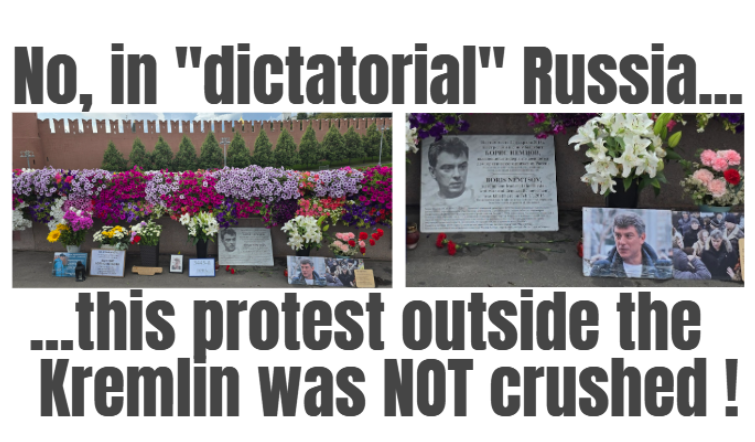
During my trip to Russia, on a Sunday in August, I was out and about in Moscow, like countless Russian families and individuals.
When I was strolling across a bridge near Red Square and the Kremlin I spotted a tiny group of demonstrators holding images of Boris Nemtsov, a politician who was shot here on February 27, 2017.
In the same year, five men were sentenced to prison terms of between 11 and 20 years by a Russian court for this murder.
In the 1990s, Nemtsov served as Deputy Prime Minister of Russia and Minister of Fuel and Energy under President Boris Yeltsin, who was popular in Washington and with Western multinational corporations that were after the country’s vast resources.
President Yeltsin, the advocate of Western interests, who allowed American multinationals to plunder Russia in co-operation with the emerging Russian oligarchs was celebrated as a hero by the American media.
Mikhail Khodorkovsky, for example, rose to the status of oligarch during this period. Like other oligarchs Khodorkovsky used dubious methods to enrich himself at the expense of the state and gain control of large corporations.
Yukos, which he got from the Yeltsin government, was once the largest Russian oil company.
In the 1990s, when lawlessness and the mafia reigned supreme in Russia, no one could amass wealth unless they followed mafia rules and had government allies like fuel and energy minister Boris Nemtsov.
Under the leadership of Vladimir Putin, things gradually changed, which led to the abysmal poverty of the population and the general chaos disappearing and the average Russian reaching a recognisable level of prosperity.
When Vladimir Putin took office in 2000, he inherited an economically ruined and socially depressed country with a life expectancy of just 65.5 years. This placed it significantly below all Western countries, at 124th in the world rankings. However, with Putin’s policies of political stability, economic growth, and enhanced security, as well as determined attempts to improve healthy lifestyles and the healthcare system, the situation has significantly improved. In well under a decade, by 2009, life expectancy in Russia had climbed to 73.7 years.
Ten years later, in 2019, the actual income of an average Russian family even exceeds the desired income (orange line) according to the graph above (black line). This is the result of an all-Russian survey with a representative sample of 1,500 people aged 18 and over living in cities and rural areas in all Russian federal districts. Since this went hand in hand with the curtailment of the overwhelming foreign economic dominance and the containment of the overpowering oligarchs, it is not surprising that Putin has since been heavily vilified and demonized in the West.
Unsurprisingly, Putin has significantly higher approval ratings than Western leaders, who obviously care less about their people.

This is confirmed by surveys conducted by independent Russian and Western pollsters, including those from American universities.
Unsurprisingly, Putin has significantly higher approval ratings than Western leaders, who obviously care less about their people.
For the average Russian, it was a sign of justice when a Russian court sentenced Khodorkovsky, considered a hero in the West and one of the country’s biggest thieves in Russia, to prison for tax evasion, fraud, money laundering and other offences.
Khodorkovsky defended himself and took the case to the European Court of Human Rights. Despite its anti-Russian bias, the court essentially dismissed his case.
Unsurprisingly, the wealthy Khodorkovsky supported Nemtsov in his post-Yeltsin political career, and both became staunch opponents of President Putin after he ended the mafia-like regime that had ruled under his predecessor and from which the two celebrities benefited while it plunged Russians into misery.
The demonstrators, supporters of Nemtsov, accuse the Russian government and its president of being responsible for his death. Despite the fact that a person as colorful and controversial as Nemtsov must have had a slew of opponents with old scores to settle.
I halted to observe the people passing past. They didn’t seem to be interested, but then a young woman stopped and shouted in annoyance at the protest: “That should be gone!’ I asked her what she had said, and she repeated it in English.
As a guest in a foreign country, I rarely discuss politics with locals, but here I made an exception and responded: “Russia’s Western enemies refer to your country as a dictatorship that suppresses free expression. When you stifle protests, you’re feeding their propaganda. Worse, they use it to legitimize economic and military aggression against your country”. She became more thoughtful and stopped repeating her demand.
Out of curiosity, I went by again in the evening to see if the protesters and their protest material had been removed. A couple of protesters, who were no longer the same as in the morning, were still there, along with their display.
Of course, my dear friends, you would not have known about this protest because you were not there. However, if the small handful of activists and their protest material had been removed by the authorities, your media would have reported on it the next morning and strongly condemned the actions of the alleged Russian dictatorship. You’ve got it!
▪ ▪ ▪
Watch my Russia travel reports on YouTube:
• Direct from Moscow: Honest Moments and Sounds from the City’s Street Life
• I enjoyed Ukrainian food in an authentic Ukrainian restaurant in the centre of Moscow
• The West tried to destroy Russia—see results! Moscow eyewitness report
• The wonderfully efficient subway is as safe as Moscow itself• Here to help! Russian businesses go the extra mile to satisfy their customers. Eyewitness report

